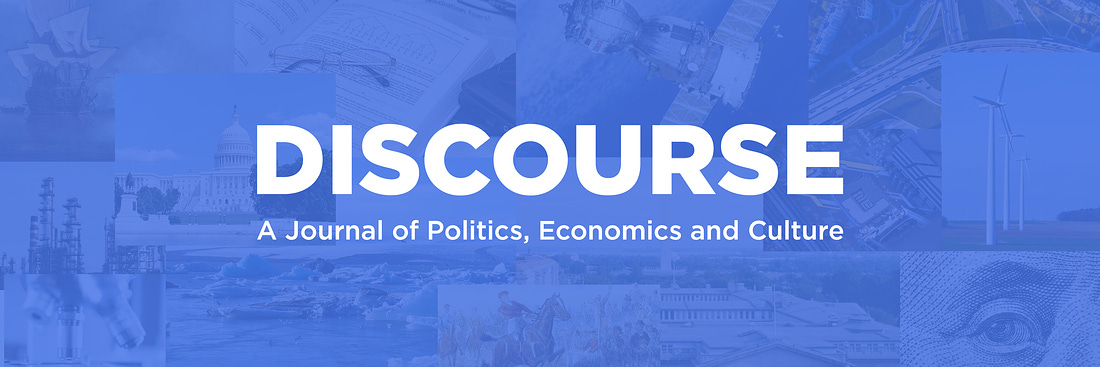|
 |
Blame It on Foucault?
The French philosopher is often invoked as a catalyst for contemporary radicalism, but his reputation is in fact a symptom of intellectual disarray in higher education
In Victor Hugo’s “Les Misérables,” Gavroche, the revolutionary street urchin, sings a song that playfully identifies the thinkers he holds responsible for his plight: “I’ve fallen to the ground. Blame it on Voltaire! My nose is in the gutter. Blame it on [Rousseau]!” During the recent campus protests relating to the Israel-Hamas war, journalists and critics have implied that student radicals are chanting a similar tune, albeit one that names a different culprit: “I see oppression everywhere. Blame it on Foucault! I cry ‘from the river to the sea.’ Blame it on Foucault, aussi!”
Thus Ross Douthat, in an op-ed headlined “What the Students Read Before They Protest,” observes how Columbia’s general education curriculum suddenly narrows when it reaches the 20th century, though it covers a broad spectrum of ideas from earlier periods of history. Douthat points out that from then on, the curriculum contemplates “progressive preoccupations and only those preoccupations.” These include “anti-colonialism, sex and gender, anti-racism, climate ... and Michel Foucault.”
Concurring with Douthat, David Brooks notes that “Columbia students who study 20th-century thought in the ‘core curriculum’ are fed a steady diet of writers like ... Michel Foucault from one ideological perspective.” Brooks makes this claim as part of an explanation for “why the protests help Trump.” Blame it on Foucault, indeed.
Finding the philosophical culprit for our current political travails is, of course, a game that intellectuals love to play. To go after wokeism, conservatives forced themselves to read Theodor Adorno and Max Horkheimer. Two decades earlier, liberals opposing the Iraq War took down neoconservatives by boning up on Leo Strauss and Allan Bloom. Yet the “blame it on Foucault” movement overstates the French thinker’s influence and capacity to damage. Rather than pegging Foucault as the cause of progressivism’s misguided radicalism, it makes far more sense to see his popularity as a symptom of the prevailing intellectual disarray in higher education.
The Case Against Foucault
What exactly are the charges that Foucault’s critics level against him? In the 1980s and ’90s, Foucault’s American critics saw him as a champion of “postmodernism”—a term, incidentally, that Foucault never used. Postmodernism was essentially a synonym for relativism. Foucault was accused of maintaining that each historical era creates its own criteria for what counts as knowledge. Consequently (his critics argued), he undermined the pursuits that defined Western thought, such as truth, justice and morality.
Foucault’s more recent critics seem to reproach him for his political views, particularly his obsession with power and his assertion that power is omnipresent. If power is everywhere, then injustice is everywhere, and outrage is always legitimate. Foucault, it would seem, is the “French connection” that explains the woke mindset.
The claim that Foucault’s thought inspired or at least has an affinity with wokeism and the campus protest movement undoubtedly has an air of plausibility. In his works from the 1970s, such as “Discipline and Punish” and “The History of Sexuality, Vol. 1,” Foucault called attention to the pervasive presence of power in all social relations. In his view, political thought has generally considered power in terms of the legal category of sovereignty—that is, as a question of who exercises legitimate authority. Meanwhile, it has ignored the dense web of power relations that saturate society.
Foucault also maintained that power cannot be equated with repression—it incentivizes as much as it prohibits—and that power often manifests itself in ways that seem unrelated to social control, most notably in knowledge. Foucault did not, however, believe that his thesis about the ubiquity of power was fatalistic. If power is everywhere, then resistance is always an option.
A Man of His Time, Not Ours
Despite the ways in which Foucault anticipated woke ideas, a passing familiarity with his thought makes it clear how out of sync he would have been with the mindset typical of today’s students. Foucault emphasized resisting power not as a means of achieving moral ideals such as justice and inclusion, but as an alternative to them: He saw resistance as an end in itself.
As a disciple of Friedrich Nietzsche, Foucault was profoundly suspicious of moral principles, which he believed frequently operated in lockstep with power. If anything, Foucault believed that wherever possible, it is important to resist the notion of objective morality itself (though he did profess to embrace a distinctly non-moral conception of “ethics”). Finally, Foucault was wary of the concept of identity, which he believed was interwoven with the power relations he wanted to challenge.
An amoral philosopher skeptical of wide-ranging social change and political demands rooted in identity hardly seems like the intellectual godfather for the current generation. There are, I think, better ways of thinking about Foucault’s relationship with woke culture and campus protests. For the record, I know of no specific instances in which Foucault has been invoked during the current wave of activism, though I suspect that it is probably true that many students have been exposed to his work.
Three Reasons to Keep an Eye on Foucault
Though my field is intellectual history, I am fairly skeptical about the ability of ideas to impact history. Sometimes ideas matter, but—more often than not—political actors cherry-pick views that legitimize their agenda. If Foucault has a place in our current cultural politics, it is, I suggest, for the following reasons:
1. Foucault provides a vocabulary that makes it possible to be radical on the cheap. As someone who has written about Foucault (more as a historical figure than as a political role model), I am struck by the poor quality of scholarship relating to Foucault that I am frequently asked to peer-review. I think the explanation is that Foucault is a difficult thinker, but it is easy to read him in a superficial way.
His work provides easy access to an elementary form of radicalism. His famous description of the Panopticon, a prison in which all prisoners are under the constant surveillance of a handful of guards, captures in a primal and uncanny way what it is like to be subject to power. Feeling observed without being able to control the observation is an experience many can relate to.
Foucault’s thought is full of seductive catchphrases: “power-knowledge,” “micropowers,” “docile bodies,” “biopower” and “governmentality,” to name a few. Some (almost throwaway) comments by Foucault concerning how power works as a dispositif—the difficult-to-translate term can be rendered in English as “apparatus” or “dispositive”—have given rise to a cottage industry of theoretical commentary. The problem is that most of this vocabulary can be used in radical rhetoric without any real commitment to an underlying theoretical framework. A small dose of Foucault is enough to make a protestor sound like an enemy of the state.
2. The thinness of Foucault’s theory is symptomatic of a university culture that no longer has a coherent message. In the postwar decades, humanities and social studies departments retained some sense that they were pursuing a collective intellectual undertaking. American historians debated the relative merits of consensus and conflict as the overriding framework for understanding U.S. history. Scholars from a range of fields drew on a blend of Max Weber, Karl Marx and American social theory to conceptualize “modernization” as the leitmotif of social scientific research. While scholars disagreed, often fiercely, there existed some sense of what the big questions were in their fields—and what students should learn.
Since the 1970s and ’80s, however, this sense of shared purpose has diminished. New paradigms in the humanities and social sciences have emerged, focused on global or transnational perspectives, postcolonialism, gender, race and other issues. Compared to the earlier period, the recent past has been—at least intellectually—an “age of fracture,” as historian Daniel Rodgers puts it.
Rather than offering a complex theory of social development, Foucault prompts his recent interpreters to find a view of history as a discontinuous sequence of power systems. From epoch to epoch, power functions in different ways, but it is always there—side by side with resistance. It is a tale full of sound and fury, no doubt, but signifying nothing.
Foucault’s thought is ideally suited to an age of fracture: Because it is concerned with power understood in isolation from a broader social or historical theory, it is just as relevant to postcolonial theory and queer studies as it is to philosophy and political science. Foucault’s thought is less a dissolver of values than a liquid that fills the cracks and craters of an already eroded intellectual landscape.
3. The goals of Foucault’s politics are ambivalent at best. The radical tactics employed during the recent campus protests seem disproportionate to what the protesters are trying to achieve. Though they have called for divestment from Israel, most of the goals that protesters have expressed are largely symbolic, such as compelling university administrators to “recognize” the genocide that they believe is occurring in Gaza. The protests express young people’s profound despair about the state of the nation and their profound distrust of institutions; they do not seem guided by some larger vision of social change. In this sense, they harmonize well with Foucault’s thought.
Foucault was a fierce critic of Marxism (though some on the left continue to fantasize about a shotgun wedding of Foucault and Marx). As such, he disliked the idea of revolution, which he saw as a construct that distracts people from the immediate struggles they encounter in their daily lives. If power is ubiquitous, the goal cannot be to get rid of it, but rather to decide how much power we are prepared to tolerate.
I suspect that many of today’s students are far more utopian than Foucault. But it may well be that they share his skepticism about politics aimed at comprehensive social change.
Foucault’s Relevance and Irrelevance
Foucault’s continuing relevance is, in many respects, mysterious. He was born in provincial France in 1926 and died in Paris in 1984. Despite his reputation as a radical postmodern philosopher, he remained throughout his life very much a creature of mid-20th-century European culture. While one could make the case that he questioned some of the foundations of Western civilization, he did so almost exclusively with the intellectual resources bequeathed by Western civilization. His work is steeped in the thought of Kant, Hegel, Heidegger and Nietzsche. His books deal almost exclusively with European history, and usually with French history. In the realm of art and literature, his tastes gravitated toward high modernism: Manet, Flaubert, surrealism, the nouveau roman.
Anyone who truly wants to understand Foucault’s thought—rather than its appropriation by American academics—must understand these preferences. It is difficult to imagine him at home in today’s world, when the reference points he took for granted have largely disappeared from public culture.
If Foucault is relevant to the culture wars occurring in higher education, it is less because of the influence exerted by his ideas than because his popularity serves as a symptom of larger and deeper trends. Gavroche’s troubles, after all, were not really due to Rousseau and Voltaire but to postrevolutionary society. Rather than blaming Foucault for the turmoil in our universities, we should ponder the uncertainty and lack of direction that now characterize higher education.
You’re currently a free subscriber to Discourse .
